#things to do in Minneapolis
Text

anyway for a little dog some threats are apparently more exciting than others
#matilda#australian cattle dog#7 months#she did not give a shit about the dinosaur#but the photo is extremely funny#this is btw just in someone's yard#there's a street near my house where two people have bigass T rex statues like this one in their yards and one has a bigass fiberglass shark#this is actually the smaller rex#taken by coffee-mage on a walk without me but I gotta take Tilly up that way more#less for her own sake but more because it sparks great joy for me#fuck I love living up north in Minneapolis sometimes#this is the kind of thing you can do if you don't go in on fucking HOAs
18 notes
·
View notes
Text
2ourdust tickets secured
#ANY MUTUALS GOING TO THE MINNEAPOLIS SHOW LMK!!!!#i really really considered doing front row since it’s all seated#but i was like. no i do not have the money to spend $500 on one ticket#maybe when i’m a lawyer i’ll be able to afford things like that hejshsmsjsk#so mid ish seats for this tour but that's ok. next time i'll get pit again or try to budget for like FRONT ROW or smth gfhdbhjfdbgjhf#anyways somerset redemption arc ‼️ lfg‼️‼️‼️
15 notes
·
View notes
Text















Blood Runs Thicker Than Water (But Both Feel the Same When Your Eyes are Closed)
Fluor Astrodath & Elegy Jones
#for the girls with teeth and horns and so much love to give it hurts#who do the wrong things for the right reasons#who are trying so hard all the goddamn time#this has been rattling around in my head since minneapolis#and it flew out of me in a case of creative zoomies#Fluor Astrodath#Elegy Jones#DMDC#web weaving
11 notes
·
View notes
Text
on the one hand, I am really good at this being my own wife deal. on the other, sure, would be nice to be someone else's. on the other other, I don't actually want that in the abstract is the problem
#I want that in the one individually specific as tagreaders know#(but also I do I or is it habit? fun!! I mean I do but it may also be habit)#anyway I and the world would both benefit I swear to you you do want this person to have a wife who is me-shaped but alas#the only way to propose platonic marriage is to disavow romantic and ALAS#ENTIRELY UNRELATEDLY I PROMISE#I am in fact a genius at being my own wife and am having a delightful time right now#anywayanyway I also googled the play by this name that I have cribbed the term from ever since and WOW I got lucky apparently#that thing ran for slightly over a month in Minneapolis and was indeed amazing
2 notes
·
View notes
Text
#cw: nazis#tw: nazis#it's the morally correct thing to do#andré cymone#minneapolis funk#minneapolis sound#80s#1980s
2 notes
·
View notes
Text
my fire opal converse arrived i’m screaming
#/hyperbole but the color is so perfect#i spent around twenty seconds screaming in a bad way because of how friggin white they are it scares me#like i don’t want to ruin them. i have owned two pairs of not-hand-me-down sneakers in my life and this is one of them#and so then i felt like a terrible person for doing purchases and wanting things and not just sticking with my old hand me down red converse#which are too small for me now and literally stained with blood. and also mud but the blood is the problem part#anyway mal blum voice oh my god look at all the stuff you got does it make your loneliness more bearable#but genuinely it kind of does. they’re my exact color it’s ridiculous guys. like it’s the color of my walls exactly#and they will make me taller so i can actually see at concerts and in the school hallway. and i’ll keep them forever#(this was an early christmas present from me to myself i put a bunch of tip money on my debit card and bought myself the shoes i’ve wanted)#they are custom because the color doesn’t come in regular converse you have to get a custom fall colors pair so i did#and so they’re lift platforms with a gold star logo patch and stripey gold and white laces it’s really cool#anyway they were supposed to arrive in time for the happy fits concert and they didn’t. but the concert didnt even happen for me so whatever#good news!!!! daisy the great is coming back this april on their first headlining tour it’s gonna be so cool#no news on the happy fits and i really want to see them and also meet them but they did say something about how they can’t wait to be back#so i hope that comes sooner rather than later and that i’m still minneapolis-adjacent enough to go#or i guess i might have to go to a show in chicago!! we grow and change with the times#anyway i’m kind of disjointed cause i woke up recently and also have been in an anxious spiral for like a week but we’re managing great#playing sudoku and being parented by my dad which means: sitting alone in my room with the door closed for hours on end#so i’m here if anybody needs me!! usually dad parenting comes with caring for my sister but she has gymnastics today so i’m like. here#anyway yeah i have these bright red-orange converse with gold on them and i’m gonna cry#i’ll post a picture soon if i’m feeling up to it they’re really exciting like almost enough to fix me#like it’s literally my color. it’s the color that i am. i’m going slightly insane about this (is insane already)#and i painted my electric guitar with nail polish so now the tuning pegs are sparkly red and it’s just a good time for the arthur community#period-induced paranoia that i thought i was done with put aside. and general anxiety put aside. the arthur community is doing great#do y’all remember mononokay by sorority noise? the arthurcore song? it still is. i’m listening to it rn and it still is#anyway idk what to say. i’m here and things are weird but i’m going back to school on monday and it won’t be as weird anymore. i hope#and i cleaned my room like actually deep cleaned it and it’s fixed now. my room is actually good now. how did that happen#anyway i want to go home but i am home. i should also eat breakfast. yeah. so i will do that now. yep#me. my post. mine.#friends only
2 notes
·
View notes
Text
well mother of fuck but I did in fact look up my chem tour dates after watching one (1) 45 sec clip and they are in fact playing the arena I saw both fall out boy and panic at in my hometown this september and I do in fact not have any current plans so if I did. well. if I did fly home to see my chemical romance. I'm just hopping on preemptively to say you cannot cast judgement on me for it.
#do i have the money for a plane ticket let alone a fucking concert ticket no <3#have i been to a concert in like 6 years no <3 am i still debilitatingly afraid of crowds in plague times yes <3#did i in fact have a disastrous experience at a gerard way concert in minneapolis st paul lmao yes indeed but heres the thing#im no longer 16 and reliant on my parents to pick up the damn phone so i dont have to go to the ER after an anxiety attack#txt
2 notes
·
View notes
Text
youtube
I'd kill to see these guys live dkjghdfkjg
#electric callboy#They finally had North American dates but only 2 Canadian dates in there and they're still so far awaaaaayyyyyyyyy#in fact the Minneapolis date is closer to me than the Canadian dates even tho I'd have to go to the states to go to it but alas#I have too many other things that require travel expenses this year to do it#Youtube
0 notes
Text
hmmmm I found a bus that leaves from relatively close to me for a to and from for the concert…… I’m dreading the thought of traffic and finding parking so I might just have to do this
#laughing at myself for how much more comfortable I am with parking wherever in st paul vs minneapolis#I know my way more around first ave/target center/field but I go to a lot more wild games than I do go to things in mpls#idk it’ll cost more than parking in money but sanity????? and at like midnight too????
1 note
·
View note
Text
no, i do not believe this level of delusion about the pandemic being “over” is sustainable. i have noticed people behaving in ways they never would have before c19, like they know deep down that things are not OK and they’re scared. international travel, huge parties, etc. i don’t know. i guess i’ve been surprised and disappointed by mass human cruelty and indifference before but i really do believe there will be a tipping point. once activists can catch their fucking breath? maybe? it took 10 years of AIDS before ACT UP took to the streets. i don’t want to wait 10 years. i’ll push as hard as i fucking can but unfortunately i’m close to bed-bound by long covid at the moment. i do not want to die. c19 activism feels like a tipping point for climate change action, anticapitalist action, and abolition action. this can be a radicalizing moment. they made the US slightly more accessible for a MINUTE and then yanked it away but we *saw* it. we saw it!!!!!!!!!! efforts to squash c19 precautions go hand-in-hand with squashing anti-police protests: they know that the summer 2020 uprisings were able to happen because enough people, for a brief moment, were freer than they had ever been in this fucking evil country. when people are given resources, they give a shit. cops were the only maskless faces in the streets of minneapolis and that is not a coincidence. the old world is fucking scared and wants you to get sick and die. c19 deaths keep climbing, your yard is burning or flooding or bogged down by smoke, cops have killed more people each year since 2020. that’s the “normal” everybody is trying to convince you it’s sooooo fun to go back to. fuck off. fuck off. there will be a crack and we will kick it open
8K notes
·
View notes
Text

Article Link
"Minnetonka first started selling its “Thunderbird” moccasins in 1965. Now, for the first time, they’ve been redesigned by a Native American designer.
It’s one step in the company’s larger work to deal with its history of cultural appropriation. The Minneapolis-based company launched in the 1940s as a small business making souvenirs for roadside gift shops in the region—including Native American-inspired moccasins, though the business wasn’t started or run by Native Americans. The moccasins soon became its biggest seller.

[Photo: Minnetonka]
Adrienne Benjamin, an Anishanaabe artist and community activist who became the company’s “reconciliation advisor,” was initially reluctant when a tribal elder approached her about meeting with the company. Other activists had dismissed the idea that the company would do the work to truly transform. But Benjamin agreed to the meeting, and the conversation convinced her to move forward.
“I sensed a genuine commitment to positive change,” she says. “They had really done their homework as far as understanding and acknowledging the wrong and the appropriation. I think they knew for a long time that things needed to get better, and they just weren’t sure what a first step was.”

Pictured: Lucie Skjefte and son Animikii [Photo: Minnetonka]
In 2020, Minnetonka publicly apologized “for having benefited from selling Native-inspired designs without directly honoring Native culture or communities.” It also said that it was actively recruiting Native Americans to work at the company, reexamining its branding, looking for Native-owned businesses to partner with, continuing to support Native American nonprofits, and that it planned to collaborate with Native American artists and designers.
Benjamin partnered with the company on the first collaboration, a collection of hand-beaded hats, and then recruited the Minneapolis-based designer Lucie Skjefte, a citizen of the Red Lake Nation, who designed the beadwork for another moccasin style and a pair of slippers for the brand. Skjefte says that she felt comfortable working with the company knowing that it had already done work with Benjamin on reconciliation. And she wasn’t a stranger to the brand. “Our grandmothers and our mothers would always look for moccasins in a clutch kind of situation where they didn’t have a pair ready and available to make on their own—then they would buy Minnetonka mocs and walk into a traditional pow wow and wear them,” she says. Her mother, she says, who passed away in 2019, would have been “immensely proud” that Skjefte’s design work was part of the moccasins—and on the new version of the Thunderbird moccasin, one of the company’s top-selling styles.

[Photo: Minnetonka]
“I started thinking about all of those stories, and what resonated with me visually,” Skjefte says. The redesign, she says, is much more detailed and authentic than the previous version. “Through the redesign and beading process, we are actively reclaiming and reconnecting our Animikii or Thunderbird motif with its Indigenous roots,” she says. Skjefte will earn royalties for the design, and Minnetonka will also separately donate a portion of the sale of each shoe to Mni Sota Fund, a nonprofit that helps Native Americans in Minnesota get training and capital for home ownership and entrepreneurship.
Some companies go a step farther—Manitobah Mukluks, based in Canada, has an Indigenous founder and more than half Indigenous staff. (While Minnetonka is actively recruiting more Native American workers, the company says that employees self-report race and it can’t share any data about its current number of Indigenous employees.) Beyond its own line of products, Manitobah also has an online Indigenous Market that features artists who earn 100% of the profit for their work.
White Bear Moccasins, a Native-owned-and-made brand in Montana, makes moccasins from bison hide. Each custom pair can take six to eight hours to make; the shoes cost hundreds of dollars, though they can also be repaired and last as long as a lifetime, says owner Shauna White Bear. In interviews, White Bear has said that she wants “to take our craft back,” from companies like Minnetonka. But she also told Fast Company that she doesn’t think that Minnetonka, as a family-owned business, should have to lose its livelihood now and stop making moccasins.
The situation is arguably different for other fashion brands that might use a Native American symbol—or rip off a Native American design completely—on a single product that could easily be taken off the market. Benjamin says that she has also worked with other companies that have discontinued products.
She sees five steps in the process of reconciliation. First, the person or company who did wrong has to acknowledge the wrong. Then they need to publicly apologize, begin to change behavior, start to rebuild trust, and then, eventually, the wronged party might take the step of forgiveness. Right now, she says, Minnetonka is in the third phase of behavior change. The brand plans to continue to collaborate with Native American designers.
The company can be an example to others on how to listen and build true relationships, Benjamin says. “I think that’s the only way that these relationships are going to get any better—people have to sit down and talk about it,” she says. “People have to be real. People have to apologize. They have to want to reconcile with people.”
The leadership at Minnetonka can also be allies in pushing other companies to do better. “My voice is important at the table as an Indigenous woman,” Benjamin says. “Lucie’s voice is important. But at tables where there’s a majority of people that aren’t Indigenous, sometimes those allies’ voices are more powerful in those spaces, because that means that they’ve signed on to what we’re saying. The power has signed on to moving forward and we agree with ‘Yes, this was wrong.’ That’s the stuff that’s going to change [things] right there.”"
-via FastCompany, February 7, 2024
#indigenous#indigenous artists#indigenous art#moccasins#thunderbird#native american#native american art#cultural appropriation#indigenous peoples#cultural representation#minnesota#minnetonka#minneapolis#red lake nation#ojibwe#anishinaabe#reconciliation#fashion#fashion news#good news#hope#indigenous designers#native artist#indigenous artist
1K notes
·
View notes
Text
Holiday Markets in the Twin Cities
Holiday Markets in the Twin Cities
Tis the season for holiday markets! I love checking off Christmas gifts for friends and family while supporting local vendors. Here’s a list of the holiday markets happening in Minneapolis & St. Paul in December.
I’ll add to this list as I find new events, and comment below if you know of one I missed!
December 2nd, 3rd & 4th
2nd: Olio Vintage
3rd: Lakes & Legends
4th: Old St. Anthony…

View On WordPress
0 notes
Video
October 14, 2022 - Alex stopped to help save a gunshot victim from bleeding out, he was then given Saint Paul Police Chiefs Award for Valor. He then gave this small speech. [video]
“I feel like I did what anyone would have done with a little bit of training that they have, that I have. I’m a certified firearms instructor, work in a high school in Minneapolis, dad and husband, and a wonderful community member.
That day, nine of your squad cars raced past us as I was flagging them down (was said in the letter you sent me), and that was a potential of 18 people. 18 people could have stopped to preserve life, but 18 people chose to go to a potential threat, and I recognize the man had a pistol and we didn’t know what he was doing. I do appreciate the recognition.
I won’t keep this stuff. This will go to my mom, this will probably go to my son because I am very uncomfortable being here with you guys. I do not rock with the police, but I do appreciate you giving me the opportunity to say these things. I just want folks to know they don’t keep us safe. We keep us safe. Riots work. Thank you.”
#acab#saint paul#truth#police#anti-police#us#usa#video#antifa#antifascism#antifascist action#2022#award
10K notes
·
View notes
Text

MINNEAPOLIS—Responding to conservative backlash over a large selection of offerings for the month of June, Target announced Friday that they would scale back their gay pride section to a single t-shirt, saying they’d do a threesome with a girl for their boyfriend’s birthday. “It’s a one-night-only thing, and we’ll both do stuff to him—nothing to each other,” reads the bright, graphic t-shirt in large rainbow block letters, the detailed rules of the encounter continuing in smaller letters onto the back, which Target representatives called “the perfect compromise to make everyone happy.”
Full story.
2K notes
·
View notes
Text
surprise songs - eras tour
3/17 - glendale, arizona : “mirrorball” and “tim mcgraw”
3/18 - glendale, arizona: “this is me trying” and “state of grace”
3/24 - las vegas, nevada: “our song” and “snow on the beach”
3/25 - las vegas, nevada: “cowboy like me” and “white horse”
3/31 - arlington, texas: “sad beautiful tragic” and “ours”
4/1 - arlington, texas: “death by a thousand cuts” and “clean”
4/2 - arlington, texas: “jump then fall” and “the lucky one”
4/13 - tampa, florida: “speak now” and “treacherous”
4/14 - tampa, florida: “the great war” and “you’re on your own kid”
4/15 - tampa, florida: “mad woman” and “mean”
4/21 - houston, texas: “wonderland” and “you’re not sorry”
4/22 - houston, texas: “a place in this world” and “today was a fairytale”
4/23 - houston, texas: “begin again” and “cold as you”
4/28 - atlanta, georgia: “the other side of the door” and “coney island”
4/29 - atlanta, georgia: “high infidelity” and “gorgeous”
4/30 - atlanta, georgia: “i bet you think about me” and “how you get the girl”
5/5 - nashville, tennessee: “sparks fly” and “teardrops on my guitar”
5/6 - nashville, tennessee: “out of the woods” and “fifteen”
5/7 - nashville, tennessee: “would’ve, could’ve, should’ve” and “mine”
5/12 - philadelphia, pennsylvania: “gold rush” and “come back…be here”
5/13 - philadelphia, pennsylvania: “forever & always” and “this love”
5/14 - philadelphia, pennsylvania: “hey stephen” and “the best day”
5/19 - foxborough, massachusetts: “should’ve said no” and “better man”
5/20 - foxborough, massachusetts: “…question?” and “invisible”
5/21 - foxborough, massachusetts: “i think he knows” and “red”
5/26 - east rutherford, new jersey: "getaway car" and "maroon"
5/27 - east rutherford, new jersey: “holy ground” and “false god”
5/28 - east rutherford, new jersey: "welcome to new york" and "clean"
6/2 - chicago, illinois: "i wish you would" and "the lakes"
6/3 - chicago, illinois: "you all over me" and "i don't wanna live forever"
6/4 - chicago, illinois: “hits different” and “the moment i knew”
6/9 - detroit, michigan: "haunted" and "i almost do"
6/10 - detroit, michigan: "all you had to do was stay" and "breathe"
6/16 - pittsburgh, pennsylvania: "mr. perfectly fine" and "the last time"
6/17 - pittsburgh, pennsylvania: "seven" and "the story of us"
6/23 - minneapolis, minnesota: “paper rings” and “if this was a movie”
6/24 - minneapolis, minnesota: “dear john” and “daylight”
6/30 - cincinnati, ohio: "i'm only me when i'm with you" and "evermore"
7/1 - cincinnati, ohio: “ivy,” “i miss you, i’m sorry,” and “call it what you want”
7/7 - kansas city, missouri: “never grow up” and “when emma falls in love”
7/8 - kansas city, missouri: “last kiss” and “dorothea”
7/14 - denver, colorado: “picture to burn” and “timeless”
7/15 - denver, colorado: “starlight” and “back to december”
7/22 - seattle, washington: “this is why we can’t have nice things” and “everything has changed”
7/23 - seattle, washington: "tied together with a smile" and "message in a bottle"
7/28 - santa clara, california: “right where you left me” and “castles crumbling”
7/29 - santa clara, california: “stay stay stay” and “all of the girls you loved before”
8/3 - los angeles, california: "i can see you" and "maroon"
8/4 - los angeles, california: "our song" and "you are in love"
8/5 - los angeles, california: “death by a thousand cuts” and “you’re on your own kid”
8/6 - los angeles, california: "i know places" and "king of my heart"
8/7 - los angeles, california: "new romantics" and "new year's day"
8/24 - mexico city, mexico: "i forgot that you existed" and "sweet nothing"
8/25 - mexico city, mexico: "tell me why" and "snow on the beach"
2K notes
·
View notes
Text
Pluralistic: Leaving Twitter had no effect on NPR's traffic

I'm coming to Minneapolis! This Sunday (Oct 15): Presenting The Internet Con at Moon Palace Books. Monday (Oct 16): Keynoting the 26th ACM Conference On Computer-Supported Cooperative Work and Social Computing.

Enshittification is the process by which a platform lures in and then captures end users (stage one), who serve as bait for business customers, who are also captured (stage two), whereupon the platform rug-pulls both groups and allocates all the value they generate and exchange to itself (stage three):
https://pluralistic.net/2023/01/21/potemkin-ai/#hey-guys
Enshittification isn't merely a form of rent-seeking – it is a uniquely digital phenomenon, because it relies on the inherent flexibility of digital systems. There are lots of intermediaries that want to extract surpluses from customers and suppliers – everyone from grocers to oil companies – but these can't be reconfigured in an eyeblink the that that purely digital services can.
A sleazy boss can hide their wage-theft with a bunch of confusing deductions to your paycheck. But when your boss is an app, it can engage in algorithmic wage discrimination, where your pay declines minutely every time you accept a job, but if you start to decline jobs, the app can raise the offer:
https://pluralistic.net/2023/04/12/algorithmic-wage-discrimination/#fishers-of-men
I call this process "twiddling": tech platforms are equipped with a million knobs on their back-ends, and platform operators can endlessly twiddle those knobs, altering the business logic from moment to moment, turning the system into an endlessly shifting quagmire where neither users nor business customers can ever be sure whether they're getting a fair deal:
https://pluralistic.net/2023/02/19/twiddler/
Social media platforms are compulsive twiddlers. They use endless variation to lure in – and then lock in – publishers, with the goal of converting these standalone businesses into commodity suppliers who are dependent on the platform, who can then be charged rent to reach the users who asked to hear from them.
Facebook designed this playbook. First, it lured in end-users by promising them a good deal: "Unlike Myspace, which spies on you from asshole to appetite, Facebook is a privacy-respecting site that will never, ever spy on you. Simply sign up, tell us everyone who matters to you, and we'll populate a feed with everything they post for public consumption":
https://lawcat.berkeley.edu/record/1128876
The users came, and locked themselves in: when people gather in social spaces, they inadvertently take one another hostage. You joined Facebook because you liked the people who were there, then others joined because they liked you. Facebook can now make life worse for all of you without losing your business. You might hate Facebook, but you like each other, and the collective action problem of deciding when and whether to go, and where you should go next, is so difficult to overcome, that you all stay in a place that's getting progressively worse.
Once its users were locked in, Facebook turned to advertisers and said, "Remember when we told these rubes we'd never spy on them? It was a lie. We spy on them with every hour that God sends, and we'll sell you access to that data in the form of dirt-cheap targeted ads."
Then Facebook went to the publishers and said, "Remember when we told these suckers that we'd only show them the things they asked to see? Total lie. Post short excerpts from your content and links back to your websites and we'll nonconsensually cram them into the eyeballs of people who never asked to see them. It's a free, high-value traffic funnel for your own site, bringing monetizable users right to your door."
Now, Facebook had to find a way to lock in those publishers. To do this, it had to twiddle. By tiny increments, Facebook deprioritized publishers' content, forcing them to make their excerpts grew progressively longer. As with gig workers, the digital flexibility of Facebook gave it lots of leeway here. Some publishers sensed the excerpts they were being asked to post were a substitute for visiting their sites – and not an enticement – and drew down their posting to Facebook.
When that happened, Facebook could twiddle in the publisher's favor, giving them broader distribution for shorter excerpts, then, once the publisher returned to the platform, Facebook drew down their traffic unless they started posting longer pieces. Twiddling lets platforms play users and business-customers like a fish on a line, giving them slack when they fight, then reeling them in when they tire.
Once Facebook converted a publisher to a commodity supplier to the platform, it reeled the publishers in. First, it deprioritized publishers' posts when they had links back to the publisher's site (under the pretext of policing "clickbait" and "malicious links"). Then, it stopped showing publishers' content to their own subscribers, extorting them to pay to "boost" their posts in order to reach people who had explicitly asked to hear from them.
For users, this meant that their feeds were increasingly populated with payola-boosted content from advertisers and pay-to-play publishers who paid Facebook's Danegeld to reach them. A user will only spend so much time on Facebook, and every post that Facebook feeds that user from someone they want to hear from is a missed opportunity to show them a post from someone who'll pay to reach them.
Here, too, twiddling lets Facebook fine-tune its approach. If a user starts to wean themself off Facebook, the algorithm (TM) can put more content the user has asked to see in the feed. When the user's participation returns to higher levels, Facebook can draw down the share of desirable content again, replacing it with monetizable content. This is done minutely, behind the scenes, automatically, and quickly. In any shell game, the quickness of the hand deceives the eye.
This is the final stage of enshittification: withdrawing surpluses from end-users and business customers, leaving behind the minimum homeopathic quantum of value for each needed to keep them locked to the platform, generating value that can be extracted and diverted to platform shareholders.
But this is a brittle equilibrium to maintain. The difference between "God, I hate this place but I just can't leave it" and "Holy shit, this sucks, I'm outta here" is razor-thin. All it takes is one privacy scandal, one livestreamed mass-shooting, one whistleblower dump, and people bolt for the exits. This kicks off a death-spiral: as users and business customers leave, the platform's shareholders demand that they squeeze the remaining population harder to make up for the loss.
One reason this gambit worked so well is that it was a long con. Platform operators and their investors have been willing to throw away billions convincing end-users and business customers to lock themselves in until it was time for the pig-butchering to begin. They financed expensive forays into additional features and complementary products meant to increase user lock-in, raising the switching costs for users who were tempted to leave.
For example, Facebook's product manager for its "photos" product wrote to Mark Zuckerberg to lay out a strategy of enticing users into uploading valuable family photos to the platform in order to "make switching costs very high for users," who would have to throw away their precious memories as the price for leaving Facebook:
https://www.eff.org/deeplinks/2021/08/facebooks-secret-war-switching-costs
The platforms' patience paid off. Their slow ratchets operated so subtly that we barely noticed the squeeze, and when we did, they relaxed the pressure until we were lulled back into complacency. Long cons require a lot of prefrontal cortex, the executive function to exercise patience and restraint.
Which brings me to Elon Musk, a man who seems to have been born without a prefrontal cortex, who has repeatedly and publicly demonstrated that he lacks any restraint, patience or planning. Elon Musk's prefrontal cortical deficit resulted in his being forced to buy Twitter, and his every action since has betrayed an even graver inability to stop tripping over his own dick.
Where Zuckerberg played enshittification as a long game, Musk is bent on speedrunning it. He doesn't slice his users up with a subtle scalpel, he hacks away at them with a hatchet.
Musk inaugurated his reign by nonconsensually flipping every user to an algorithmic feed which was crammed with ads and posts from "verified" users whose blue ticks verified solely that they had $8 ($11 for iOS users). Where Facebook deployed substantial effort to enticing users who tired of eyeball-cramming feed decay by temporarily improving their feeds, Musk's Twitter actually overrode users' choice to switch back to a chronological feed by repeatedly flipping them back to more monetizable, algorithmic feeds.
Then came the squeeze on publishers. Musk's Twitter rolled out a bewildering array of "verification" ticks, each priced higher than the last, and publishers who refused to pay found their subscribers taken hostage, with Twitter downranking or shadowbanning their content unless they paid.
(Musk also squeezed advertisers, keeping the same high prices but reducing the quality of the offer by killing programs that kept advertisers' content from being published along Holocaust denial and open calls for genocide.)
Today, Musk continues to squeeze advertisers, publishers and users, and his hamfisted enticements to make up for these depredations are spectacularly bad, and even illegal, like offering advertisers a new kind of ad that isn't associated with any Twitter account, can't be blocked, and is not labeled as an ad:
https://www.wired.com/story/xs-sneaky-new-ads-might-be-illegal/
Of course, Musk has a compulsive bullshitter's contempt for the press, so he has far fewer enticements for them to stay. Quite the reverse: first, Musk removed headlines from link previews, rendering posts by publishers that went to their own sites into stock-art enigmas that generated no traffic:
https://www.theguardian.com/technology/2023/oct/05/x-twitter-strips-headlines-new-links-why-elon-musk
Then he jumped straight to the end-stage of enshittification by announcing that he would shadowban any newsmedia posts with links to sites other than Twitter, "because there is less time spent if people click away." Publishers were advised to "post content in long form on this platform":
https://mamot.fr/@pluralistic/111183068362793821
Where a canny enshittifier would have gestured at a gaslighting explanation ("we're shadowbanning posts with links because they might be malicious"), Musk busts out the motto of the Darth Vader MBA: "I am altering the deal, pray I don't alter it any further."
All this has the effect of highlighting just how little residual value there is on the platform for publishers, and tempts them to bolt for the exits. Six months ago, NPR lost all patience with Musk's shenanigans, and quit the service. Half a year later, they've revealed how low the switching cost for a major news outlet that leaves Twitter really are: NPR's traffic, post-Twitter, has declined by less than a single percentage point:
https://niemanreports.org/articles/npr-twitter-musk/
NPR's Twitter accounts had 8.7 million followers, but even six months ago, Musk's enshittification speedrun had drawn down NPR's ability to reach those users to a negligible level. The 8.7 million number was an illusion, a shell game Musk played on publishers like NPR in a bid to get them to buy a five-figure iridium checkmark or even a six-figure titanium one.
On Twitter, the true number of followers you have is effectively zero – not because Twitter users haven't explicitly instructed the service to show them your posts, but because every post in their feeds that they want to see is a post that no one can be charged to show them.
I've experienced this myself. Three and a half years ago, I left Boing Boing and started pluralistic.net, my cross-platform, open access, surveillance-free, daily newsletter and blog:
https://pluralistic.net/2023/02/19/drei-drei-drei/#now-we-are-three
Boing Boing had the good fortune to have attracted a sizable audience before the advent of siloed platforms, and a large portion of that audience came to the site directly, rather than following us on social media. I knew that, starting a new platform from scratch, I wouldn't have that luxury. My audience would come from social media, and it would be up to me to convert readers into people who followed me on platforms I controlled – where neither they nor I could be held to ransom.
I embraced a strategy called POSSE: Post Own Site, Syndicate Everywhere. With POSSE, the permalink and native habitat for your material is a site you control (in my case, a WordPress blog with all the telemetry, logging and surveillance disabled). Then you repost that content to other platforms – mostly social media – with links back to your own site:
https://indieweb.org/POSSE
There are a lot of automated tools to help you with this, but the platforms have gone to great lengths to break or neuter them. Musk's attack on Twitter's legendarily flexible and powerful API killed every automation tool that might help with this. I was lucky enough to have a reader – Loren Kohnfelder – who coded me some python scripts that automate much of the process, but POSSE remains a very labor-intensive and error-prone methodology:
https://pluralistic.net/2021/01/13/two-decades/#hfbd
And of all the feeds I produce – email, RSS, Discourse, Medium, Tumblr, Mastodon – none is as labor-intensive as Twitter's. It is an unforgiving medium to begin with, and Musk's drawdown of engineering support has made it wildly unreliable. Many's the time I've set up 20+ posts in a thread, only to have the browser tab reload itself and wipe out all my work.
But I stuck with Twitter, because I have a half-million followers, and to the extent that I reach them there, I can hope that they will follow the permalinks to Pluralistic proper and switch over to RSS, or email, or a daily visit to the blog.
But with each day, the case for using Twitter grows weaker. I get ten times as many replies and reposts on Mastodon, though my Mastodon follower count is a tenth the size of my (increasingly hypothetical) Twitter audience.
All this raises the question of what can or should be done about Twitter. One possible regulatory response would be to impose an "End-To-End" rule on the service, requiring that Twitter deliver posts from willing senders to willing receivers without interfering in them. End-To-end is the bedrock of the internet (one of its incarnations is Net Neutrality) and it's a proven counterenshittificatory force:
https://www.eff.org/deeplinks/2023/06/save-news-we-need-end-end-web
Despite what you may have heard, "freedom of reach" is freedom of speech: when a platform interposes itself between willing speakers and their willing audiences, it arrogates to itself the power to control what we're allowed to say and who is allowed to hear us:
https://pluralistic.net/2022/12/10/e2e/#the-censors-pen
We have a wide variety of tools to make a rule like this stick. For one thing, Musk's Twitter has violated innumerable laws and consent decrees in the US, Canada and the EU, which creates a space for regulators to impose "conduct remedies" on the company.
But there's also existing regulatory authorities, like the FTC's Section Five powers, which enable the agency to act against companies that engage in "unfair and deceptive" acts. When Twitter asks you who you want to hear from, then refuses to deliver their posts to you unless they pay a bribe, that's both "unfair and deceptive":
https://pluralistic.net/2023/01/10/the-courage-to-govern/#whos-in-charge
But that's only a stopgap. The problem with Twitter isn't that this important service is run by the wrong mercurial, mediocre billionaire: it's that hundreds of millions of people are at the mercy of any foolish corporate leader. While there's a short-term case for improving the platforms, our long-term strategy should be evacuating them:
https://pluralistic.net/2023/07/18/urban-wildlife-interface/#combustible-walled-gardens
To make that a reality, we could also impose a "Right To Exit" on the platforms. This would be an interoperability rule that would require Twitter to adopt Mastodon's approach to server-hopping: click a link to export the list of everyone who follows you on one server, click another link to upload that file to another server, and all your followers and followees are relocated to your new digs:
https://pluralistic.net/2022/12/23/semipermeable-membranes/#free-as-in-puppies
A Twitter with the Right To Exit would exert a powerful discipline even on the stunted self-regulatory centers of Elon Musk's brain. If he banned a reporter for publishing truthful coverage that cast him in a bad light, that reporter would have the legal right to move to another platform, and continue to reach the people who follow them on Twitter. Publishers aghast at having the headlines removed from their Twitter posts could go somewhere less slipshod and still reach the people who want to hear from them on Twitter.
And both Right To Exit and End-To-End satisfy the two prime tests for sound internet regulation: first, they are easy to administer. If you want to know whether Musk is permitting harassment on his platform, you have to agree on a definition of harassment, determine whether a given act meets that definition, and then investigate whether Twitter took reasonable steps to prevent it.
By contrast, administering End-To-End merely requires that you post something and see if your followers receive it. Administering Right To Exit is as simple as saying, "OK, Twitter, I know you say you gave Cory his follower and followee file, but he says he never got it. Just send him another copy, and this time, CC the regulator so we can verify that it arrived."
Beyond administration, there's the cost of compliance. Requiring Twitter to police its users' conduct also requires it to hire an army of moderators – something that Elon Musk might be able to afford, but community-supported, small federated servers couldn't. A tech regulation can easily become a barrier to entry, blocking better competitors who might replace the company whose conduct spurred the regulation in the first place.
End-to-End does not present this kind of barrier. The default state for a social media platform is to deliver posts from accounts to their followers. Interfering with End-To-End costs more than delivering the messages users want to have. Likewise, a Right To Exit is a solved problem, built into the open Mastodon protocol, itself built atop the open ActivityPub standard.
It's not just Twitter. Every platform is consuming itself in an orgy of enshittification. This is the Great Enshittening, a moment of universal, end-stage platform decay. As the platforms burn, calls to address the fires grow louder and harder for policymakers to resist. But not all solutions to platform decay are created equal. Some solutions will perversely enshrine the dominance of platforms, help make them both too big to fail and too big to jail.
Musk has flagrantly violated so many rules, laws and consent decrees that he has accidentally turned Twitter into the perfect starting point for a program of platform reform and platform evacuation.

If you'd like an essay-formatted version of this post to read or share, here's a link to it on pluralistic.net, my surveillance-free, ad-free, tracker-free blog:
https://pluralistic.net/2023/10/14/freedom-of-reach/#ex

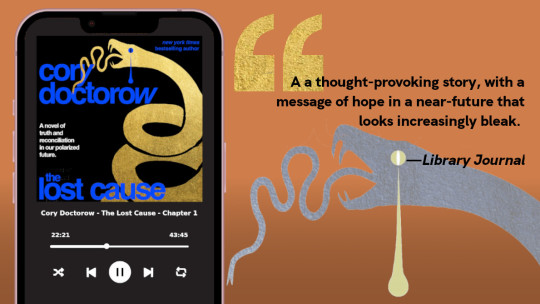
My next novel is The Lost Cause, a hopeful novel of the climate emergency. Amazon won't sell the audiobook, so I made my own and I'm pre-selling it on Kickstarter!

Image:
JD Lasica (modified)
https://commons.wikimedia.org/wiki/File:Elon_Musk_%283018710552%29.jpg
CC BY 2.0
https://creativecommons.org/licenses/by/2.0/deed.en
#pluralistic#twitter#posse#elon musk#x#social media#graceful failure modes#end-to-end principle#administratable remedies#good regulation#ads#privacy#benevolent dictatorships#freedom of reach#journalism#enshittification#switching costs
795 notes
·
View notes